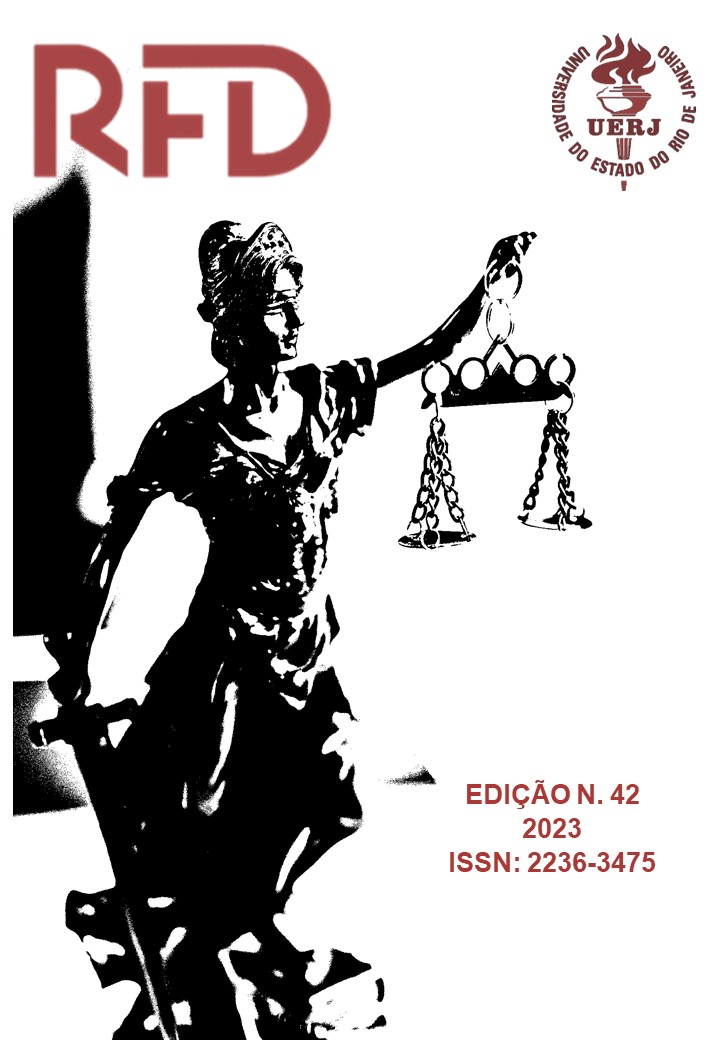PROCURADORIAS ESPECIAIS DAS MULHERES NOS ESTADOS BRASILEIROS: UMA REALIDADE PARADOXAL / WOMEN’S SPECIAL OFFICES IN BRAZILIAN STATES: A PARADOXICAL REALITY
DOI:
https://doi.org/10.12957/rfd.2023.57605Keywords:
Procuradorias Especiais das Mulheres, Constitucionalismo Feminista, Democracia, Igualdade de Gênero.Abstract
Resumo: O artigo realiza, a partir de uma metodologia de abordagem exploratória, uma análise das estruturas organizacionais existentes nas Assembleias Legislativas dos Estados Brasileiros e na Câmara Legislativa do Distrito Federal, investigando a presença de categorias funcionais voltadas à construção, à defesa e à promoção dos direitos das mulheres, tendo como ponto de partida a ênfase nas assim chamadas Procuradorias Especiais das Mulheres. Partindo de uma conceituação e categorização geral de tais estruturas, este escrito pontua os aspectos gerais da presença de tais categorias nas referidas Casas Legislativas, em seguida concentrando esforços em uma análise crítica de sua presença – ou ausência – nas Assembleias Legislativas dos Estados do Rio Grande do Norte e do Rio Grande do Sul. Empregado a metodologia feminista de desvelamento da existência concreta das mulheres em sua relação com as estruturas jurídicas estudadas, conclui-se que há forte assimetria no emprego de estruturas de construção, proteção e promoção da igualdade de gênero nas Casas Legislativas estudadas, sendo também marcante o caráter tópico, assistemático e limitado de tal emprego, especialmente considerando-se as informações tornadas públicas nos sítios eletrônicos das respectivas Assembleias/Câmara Legislativas. Pareceu ainda ser possível afirmar que estruturas como as Procuradorias das Mulheres são iniciativas importantes de ativismo necessário à concretização de uma democracia plural e igualitária, constitucionalmente albergadas, contribuindo para o cumprimento dos deveres constitucionais dos parlamentos pátrios; no entanto, sua existência, assim como a representação de mulheres e de outros grupos vulnerabilizados junto a tais órgãos de poder, necessitam superar práticas meramente formais e/ou simbólicas, as quais, embora importantes, são insuficientes.
Palavras-chave: Procuradorias Especiais das Mulheres; Constitucionalismo Feminista; Democracia; Igualdade de Gênero.
Abstract: The article takes an exploratory methodological approach to the organizational structures existing in the Legislative Assemblies of the Brazilian States and in the Legislative Chamber of the Federal District, investigating the presence of functional categories aimed at the construction, defense and promotion of women's rights, having as a starting point the emphasis on so-called Women's Special Offices. Departing from a general conceptualization and categorization of such structures, this paper points out the general aspects of the presence of such categories in the referred Legislative Houses, then concentrating efforts on a critical analysis of their presence - or absence - in the Legislative Assemblies of the States of Rio Grande do Norte and Rio Grande do Sul. Using the feminist methodology of unveiling the concrete existence of women in their relationship with the legal structures studied, it is concluded that there is a strong asymmetry in the use of the structures for the construction, protection and promotion of gender equality in the studied Legislative Houses, the topical, unsystematic and limited character of such employment is also remarkable, especially considering the information made public on the websites of the respective Legislative Assemblies / Chamber. It also seemed possible to affirm that structures such as the Women's Special Offices are important initiatives, with the necessary activism for the realization of a constitutionally plural and egalitarian democracy, contributing to the fulfillment of the constitutional duties of the national parliaments; however, their existence, as well as the representation of women and other vulnerable groups within such branches of power, need to overcome merely formal and / or symbolic practices, which, although important, are insufficient.
Keywords: Women’s Special Offices; Feminist Constitutionalism; Democracy; Gender Equality.
Downloads
Published
How to Cite
Issue
Section
License
Copyright
oArticles published in the Revista da Faculdade de Direito da UERJ (RFD/UERJ)
The copyrights of the published articles belong to the Revista da Faculdade de Direito da UERJ (RFD/UERJ). Total or partial reproduction of the articles is allowed as long as the source is cited.
oPartial reproduction from other publications
Submitted papers that contain parts of text extracted from other publications must obey the specified limits to ensure originality of the submitted work. Plagiarism in all its forms constitutes unethical behavior and is unacceptable.
It is recommended to avoid reproduction of tables and illustrations from other publications. The article that contains reproduction of one or more tables and/or illustrations from other publications will only be sent for analysis if it is accompanied by written permission from the copyright holder of the original work for the specified reproduction in the Revista da Faculdade de Direito da UERJ (RFD/UERJ). The permission must be addressed to the author of the submitted work. Under no circumstances will the Journal of the Law School of the State University of Rio de Janeiro (RFD/UERJ) and the authors of the papers published in this journal transfer the rights thus obtained.
•The refused studies will be returned to the authors, if asked.

The Revista da Faculdade de Direito is licensed under a Creative Commons Atribuição 4.0 Internacional License.
This work is licensed under a Creative Commons 4.0 Attribution-No Derivation License.
This license allows copying and redistribution of the material in any medium or format for any purpose, even commercial, provided that the original authorship is acknowledged.










